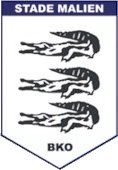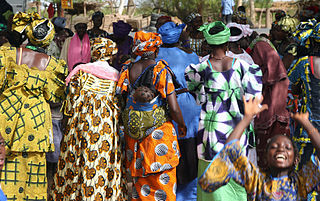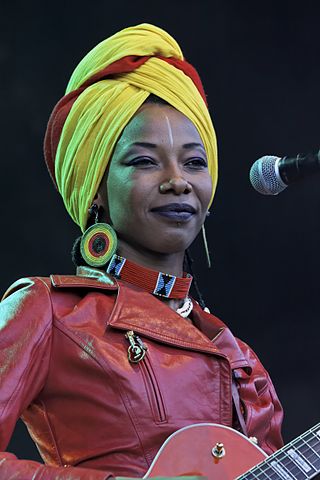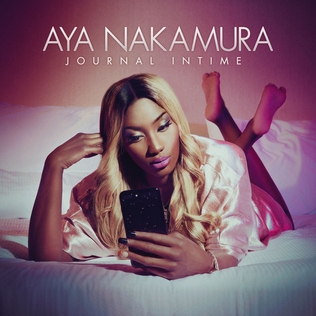Related Research Articles

Oumou Sangaré is a Malian Wassoulou singer of Fulani or Fula descent. She is often referred to as "The Songbird of Wassoulou". Wassoulou is a historical region south of the Niger River, where the music descends from age-old traditional song, often accompanied by a calabash.
"Le Mali" is the national anthem of Mali. Adopted in 1962, it was written by Seydou Badian Kouyaté, while the music is attributed to Banzumana Sissoko. It is popularly known as "Pour l'Afrique et pour toi, Mali" or "À ton appel Mali".

Wassoulou is a cultural area and historical region in the Wassoulou River Valley of West Africa. It is home to about 160,000 people, and is also the native land of the Wassoulou genre of music.

The Festival au désert was an annual concert in Mali, showcasing traditional Tuareg music as well as music from around the world between 2001 and 2012. It was founded and directed by Manny Ansar, and attracted thousands of visitors, bringing a huge boost to the economy.
Diarra is a French translation of the clan name Jara used in West Africa, as a hangover from the French colonial empire in that region. It originates from the Bambara language word jara, meaning lion, synonymous with waraba. The Kingdom of Diarra existed from the 7th Century until the 19th Century. The name is also frequently used with reference to the 18th to early 19th-century Bambara Empire in Ségou, Mali, which was ruled successively by Ngolo Diarra, his son Mansong Diarra, and then his son Da Diarra.

Stade Malien is a Malian professional football and sports club based in Bamako. One of the two dominant clubs of Malian football, their eastern Bamako training grounds host other sports as well, including a successful basketball club.

Articles related to Mali include:

The culture of Mali derives from the shared experience, as a colonial and post-colonial polity, and the interaction of the numerous cultures which make up the Malian people. What is today the nation of Mali was united first in the medieval period as the Mali Empire. While the current state does not include areas in the southwest, and is expanded far to the east and northeast, the dominant roles of the Mandé people is shared by the modern Mali, and the empire from which its name originates from.
Seydou Badian Kouyaté was a Malian writer and politician. He wrote the lyrics to the Malian national anthem, "Le Mali".
The Grand prix littéraire d'Afrique noire is a literary prize presented every year by the ADELF, the Association of French Language Writers for a French original text from Sub-Saharan Africa. It was originally endowed with 2,000 french francs.
The Wind is a 1982 Malian drama film directed by Souleymane Cissé. It was screened in the Un Certain Regard section at the 1982 Cannes Film Festival.

Fatoumata Diawara is a Malian singer-songwriter currently living in France.

Journal intime is the debut studio album from French singer Aya Nakamura. It was released on 25 August 2017 by Warner Music France.
Events in the year 2018 in Mali.

Fatoumata Keïta, also known as Fatim Keïta, is a Malian writer of novels, poetry, and essays. Her work deals with contemporary Malian society, both urban and rural.
Marie-Louise Belarbi was a French-Moroccan bookseller, publisher, editor, and writer. Born in France, she spent most of her life in Morocco, where she established a popular bookstore, Carrefour des Livres, as well as a publishing house for French, Moroccan and Maghreb literature. She published works by several notable writers, including Françoise Sagan, Tahar Ben Jelloun, Driss Chraïbi, Abdellah Taïa and others. She also wrote two books, a novel and a memoir. In 2001, she was awarded the distinction of an officer of the French Ordre des Arts et des Lettres for her contributions to publishing and literature.

Oumou Sall Seck is a Malian politician and ambassador.
Samba Gaïné Sangaré was a Malian author and politician who participated in a 1969 coup plot to overthrow Moussa Traoré. Sangare was sentenced to ten years of hard labor in Taoudenni, and wrote the book Ten Years of Hard Labor in Taoudenni about his experience.
References
- 1 2 "Introduction: Oumou Armand Diarra, écrivaine malienne" (in French). Archived from the original on February 12, 2019. Retrieved 2019-02-09.
{{cite web}}: CS1 maint: unfit URL (link) - ↑ "Oumou Armand Diarra". aflit.arts.uwa.edu.au. Retrieved 2019-02-09.
- ↑ Moussa Bolly, Diarra Oumou Armand Sangaré, écrivaine : «Les écrivaines doivent être des ambassadrices de la paix», Journal L'Indépendant (maliweb.net), 28 August 2015.
- ↑ Diarra, Oumou Armand (2011-02-01). The Shadow of the Mysterious Nayouma. Xlibris Corporation. ISBN 9781456868994.